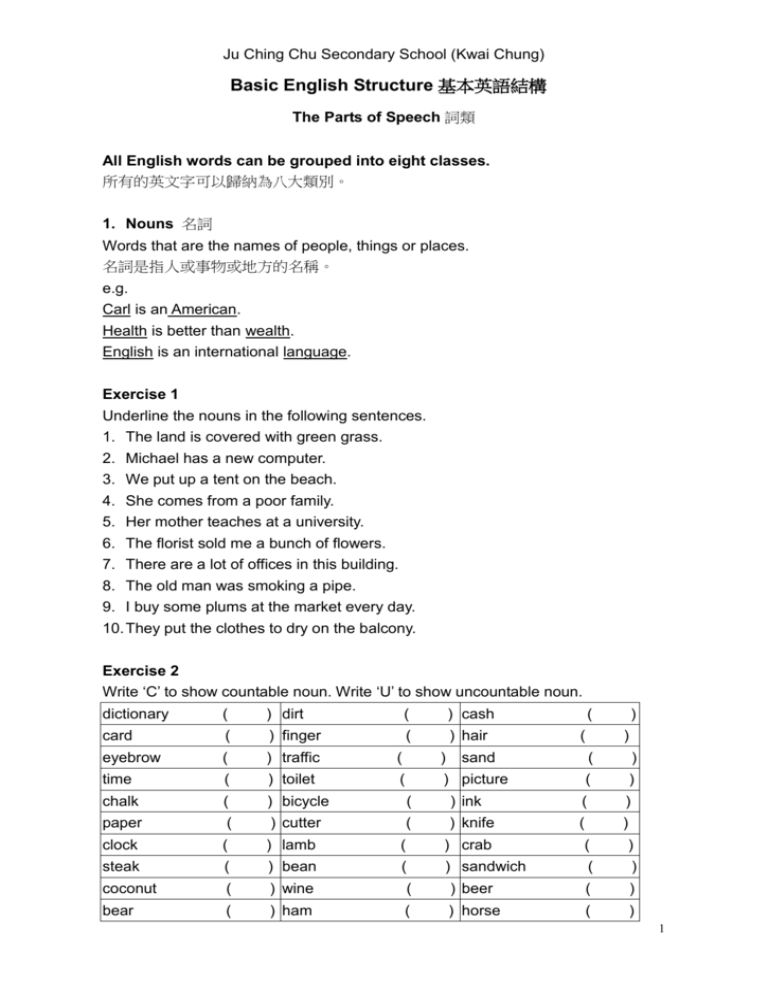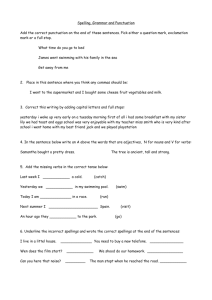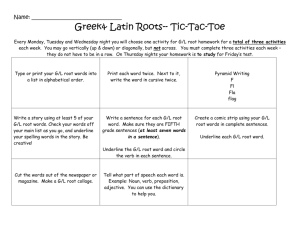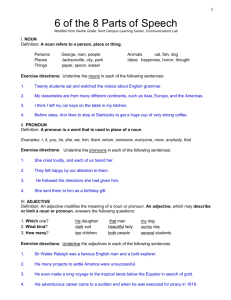Notes & Exercises
advertisement

Ju Ching Chu Secondary School (Kwai Chung) Basic English Structure 基本英語結構 The Parts of Speech 詞類 All English words can be grouped into eight classes. 所有的英文字可以歸納為八大類別。 1. Nouns 名詞 Words that are the names of people, things or places. 名詞是指人或事物或地方的名稱。 e.g. Carl is an American. Health is better than wealth. English is an international language. Exercise 1 Underline the nouns in the following sentences. 1. The land is covered with green grass. 2. Michael has a new computer. 3. We put up a tent on the beach. 4. She comes from a poor family. 5. Her mother teaches at a university. 6. The florist sold me a bunch of flowers. 7. There are a lot of offices in this building. 8. The old man was smoking a pipe. 9. I buy some plums at the market every day. 10. They put the clothes to dry on the balcony. Exercise 2 Write ‘C’ to show countable noun. Write ‘U’ to show uncountable noun. dictionary ( ) dirt ( ) cash ( card ( ) finger ( ) hair eyebrow ( ) traffic ( ) sand ( ) time ( ) toilet ( ) picture ( ) chalk ( ) bicycle ( ) ink ( ) paper ( ) cutter ( ) knife ( ) clock ( ) lamb ( ) crab ( ) steak ( ) bean ( ) sandwich ( ) coconut ( ) wine ( ) beer ( ) bear ( ) ham ( ) horse ( ) ( ) ) 1 Exercise 3 Circle the best words. 1. Would you please give me ( a / some / an ) orange juice? 2. Mike is drinking ( a / some / an ) milk. 3. Michael has ( a / some / an ) stamp. 4. David is having ( a / some / an ) congee. 5. Don’t forget to buy ( a / some / an ) oil for mother. 6. That is ( a / some / an ) bag of flour. 7. There is ( a / some / an ) egg in the fridge. 8. May puts ( a / some / an ) jam on her biscuits. 9. There are ( a / some / an ) children in the park. 10. There is ( a / some / an ) desk in my room. 2. Pronouns 代名詞 Words that replace the nouns. 代名詞是用來代替名詞的詞。 e.g. Tom is a Chinese. He was born in Hong Kong. Someone is calling you outside. I have a gold watch, and my sister has also one. Mine is better than hers. Pronoun Chart: 代名詞列表 Subject Pronoun Object Pronoun Possessive Adjective Possessive PronounR Reflexive Pronoun 主語代名詞 賓語代名詞 物主形容詞 物主代名詞 反身代名詞 I me my mine myself we us our ours ourselves you (singular) you your yours yourself you (plural) you your yours yourselves he him his his himself she her her hers herself it it its (not used) itself they them their theirs themselves Exercise 1 Underline the pronouns in the following sentences. 1. I lost my purse. 2. We want someone to go. 3. My mother hits me. 4. Can anyone help us? 2 5. That’s mine! Give it back to me. 6. The cat is lovely. It has a long tail. 7. I knocked on the door but nobody answered. 8. I am angry with him. 9. I think she is a fool. 10. They finished the project by themselves. Exercise 2 Fill in the each blank with either a ‘Subject Pronoun’ or an ‘Object Pronoun’. 1. I don’t know. The teacher didn’t tell __________. 2. The principal punished __________ because he was lazy. 3. The correction fluid was here a minute ago. __________ is not here now. 4. I can’t do these sums. Will you please help __________? 5. The babies are sleeping. Don’t disturb __________. 6. I like Leon. __________ is my best friend. 7. Jenny has a canoe. Her father gave it to __________. 8. Who are those men? I have never seen __________ before. 9. Is he your father? Yes, __________ is. 10. I have bought a new tracksuit. Do you want to see __________? Exercise 3 Fill in the blanks with correct ‘Possessive Adjectives’. 1. The twins sew __________ own clothes. 2. We are washing __________ cars. 3. I threw the cloth away because __________ colour had faded. 4. __________ eyesight is not good. I need to wear a pair of glasses. 5. Peter’s dog has white fur and __________ tail is long. 6. Did you brush __________ teeth this morning? 7. The lady showed us __________ jewellery. 8. We ought to be proud of __________ parents. 9. John went to see __________ doctor. 10. The cat licks __________ wet fur. Exercise 4 Rewrite each of the following sentences with a suitable ‘Possessive Pronoun’. 1. That isn’t my notebook. ______________________________________________________________ 2. Are these your pencils? ______________________________________________________________ 3. My wife and I built this house. It is our house. ______________________________________________________________ 3 4. These are his dogs. ______________________________________________________________ 5. Those are their pencil boxes. ______________________________________________________________ Exercise 5 Underline the correct word. 1. I enjoyed ( himself , myself ) very much at the party last night. 2. You can look at ( yourself , myself ) in the mirror. 3. Tommy hurt ( himself , yourself ) yesterday. 4. We bought ( themselves , ourselves ) some beancurd. 5. Did you cut ( herself , yourself ) a slice of watermelon? 3. Adjectives 形容詞 Words that qualify nouns by making its meaning clearer, fuller, or more exact. Articles can be classified as Adjectives. 形容詞是描述名詞所指的人、事物等的詞。它們把名詞修飾得更清晰、完整和準確。 冠詞也可被分類為形容詞。 e.g. a rich man The apple is ripe. I am interested in painting. A smiling baby Order of adjectives: 形容詞的次序 The usual order is: Opinion/value, Size, Age, Shape, Colour, Origin, Material 般的次序是:看法/價值、大小、年齡、形狀、顏色、來源、材料 The adjectives in the table below follow Opinion/value beautiful, lovely, easy, boring, interesting Size big, huge, small, tall, short Age old, new, young, ancient Shape round, square, rectangular Colour white, black, red, green Origin Chinese, American, Japanese, European Material wooden, plastic, glass, paper this 一 order : 4 Exercise 1 Underline the adjectives in the following sentences. 1. Can you lift that heavy box? 2. Cows are useful animals. 3. She is a kind girl. 4. Your hands are dirty. Please wash them at once. 5. My grandfather is very old. 6. We should keep the classroom clean. 7. Peter is sad today. 8. We want to eat food when we are hungry. 9. The trousers I bought yesterday were too tight. 10. My mother was angry with me because I had broken her vase. Exercise 2 Circle the best answer. 1. Football is an ( exciting / comfortable / clever ) game. 2. 3. 4. 5. 6. 7. We go to see a doctor when we are ( hungry / angry / ill ). They feel ( comfortable / sleepy / happy ). It is very late. The bus does not stop because it is ( big / quick / full ). He is a ( brave / famous / cruel ) doctor. We lost our dog. We felt ( interesting /sweet / sad ). The mouse was ( afraid / polite / slow ) and ran away quickly. 8. It is very ( careful / dangerous / clever ) to play in the street. 9. He is looking for food. He is ( tired / thirsty / hungry ). 10. I don’t want to play with the (naughty / tiring / lonely ) girl. Exercise 3 Put the words in the correct order. 1. dress / long / silk / party / a _________________________________________________________. 2. big / card / colourful / birthday / a _________________________________________________________. 3. strawberry / French / two / cakes _________________________________________________________. 4. coffee / old / Italian / shop / an _________________________________________________________. 5. boxes / lunch / ten / large _________________________________________________________. 6. young / American / three / students _________________________________________________________. 5 4. Verbs 動詞 Words that express the idea of action or being. 動詞是表示動作或狀態的詞 e.g. Snow is white. The enemy was defeated. The earth moves round the sun. He has been painting the wall for four hours. Exercise 1 Underline the verbs in the following sentences. 1. Add a little salt to the soup. 2. A car appeared in the street. 3. Aunt Mary arranged the flowers in a vase. 4. Two boys died in the car accident. 5. Peter’s mother never drinks. 6. John always feeds his dog a bone. 7. I got a wallet for my father yesterday. 8. I heard him singing in the bathroom. 9. My brother hit me on the back. 10. I saw a boy climbing the tree. 5. Adverbs 副詞 Words that we can add to a verb to make its meaning clearer, fuller, or more exact. 副詞的本意是補充動詞的意思。它們把動詞修飾得更清晰、完整和準確。 e.g. He ran slowly. (slowly modifies the verb ‘ran’) I will see her tomorrow. (tomorrow modifies the verb ‘will see’) He speaks English very well. (well modifies the verb ’speaks’, very modifies another adverb ‘well’) His father is quite old. (quite modifies the adjective ‘old’) Exercise 1 Underline the adverbs in the following sentences. 1. The rain fell heavily last night. 2. The fisherman sailed happily towards the shore. 3. Where have you been recently? 4. Maria will go to a new school soon. 5. When he last called on me, I was not at home. 6. John ate the cake greedily. 6 7. The apple is rather sweet. 8. My father is always busy. 9. What are you doing tomorrow? 10. He found the pen there. Exercise 2 Circle the best answer. 1. We all sat ( quiet / quietly ) and waited. No one talked. No one moved. Everyone was ( quiet / quietly ). 2. ‘Keep ( calm / calmly ), please,’ said the inspector. ‘If fire breaks out, walk ( calm / calmly ) down the stairs and go out from the front door.’ 3. That pretty lady is very ( polite / politely ). She always answers the questions ( polite / politely ). 4. John fought ( brave / bravely ) in the battle. He is a ( brave / bravely ) soldier. 5. We are a ( happy / happily ) family. We live and work ( happy / happily ) together. Exercise 3 Fill in the blanks with the following adverbs. 1. 2. 3. 4. 5. 6. soundly carelessly again and again across alone along unkindly twice neatly aloud Our teacher explains the difficult words ________________. The river is too wide. We can’t swim ________________. You have to read _______________ so that everyone can hear you. I have read this story book _______________. Walk _____________ and you can see the church. We must do our homework _______________. 7. Johnny hit his dog _______________. 8. My father slept _______________ in the sitting room. 9. The lazy girl did her work _______________. 10. Peter goes to school _______________ every day. 7 6. Prepositions 介詞 Words that are used to show the relationship between the noun or pronoun and another word. 介詞是用來表示名詞或代名詞與另外一個詞之間的關係。 e.g. The lamp hangs over the table. The smoke went up the chimney. I sent the parcel to him; it went by airmail. I am sitting in front of John. Exercise 1 Underline the prepositions in the following sentences. 1. Is this the way to Tsim Sha Tsui? 2. Peter will go to Japan on business next month. 3. The children sat under a tree. 4. Please keep off the grass. 5. Mary sits behind me. 6. The weather is hot in summer. 7. Birds cannot fly without wings. 8. I go to school by bus every day. 9. I am hot. Please turn on the air-conditioner. 10. Ivy likes staying at home on Sundays. Exercise 2 Circle the best answer. 1. They will fly to the State ( on / in / for ) a few months. 2. My grandfather has been ill ( for / from / since ) last Sunday. 3. That stamp is similar ( to / about / in ) this one. 4. He is not interested ( in / at / of ) swimming. 5. The students put all the books ( down / into / from ) their bags. 6. John is good ( up / in / at ) drawing. 7. I put ( with / on / to ) my coat before going out. 8. Thank you so much ( in / to / for ) your help. 9. We pray ( to / at / for ) God in the church. 10. It is dark. Please turn ( on / off / at ) the light. 7. Conjunctions 連接詞 Words that are used to join words, phrases or sentences. 連接詞是用來連接詞語、片語或句子的詞。 e.g. 8 A boy and a girl were walking together. He can’t read or write. He worked hard because he wanted to succeed. She liked neither the food nor the drink. Although he started poorly, he won the game. Exercise 1 Underline the conjunctions in the following sentences. 1. I have a cake and some sweets. 2. Do you like coffee or tea? 3. We did not play tennis because it was raining. 4. The lady is rich but the man is poor. 5. Sally does her homework although she is very ill. 6. Don’t go out until the bell rings. 7. You will get wet if you don’t take your raincoat. 8. I felt sleepy, so I went to bed. 9. If he studies hard, he will pass the test. 10. Fish can swim but cannot fly. Exercise 2 Fill in the blanks with one of the following conjunctions. 1. 2. 3. 4. 5. 6. 7. and but because since although before after until I have not seen her _______________ she left Hong Kong. I shall wait _______________ your mother comes. She did not go to school yesterday _______________ she was ill. They are generous _______________ they are poor. The baby felt asleep _______________ it had cried for a long time. Mary is poor _______________ happy. Betty is clever _______________ kind. 8. I brush my teeth _______________ I go to bed. 8. Interjections 感嘆詞 Words that express a sudden feeling or emotion. 感嘆詞是用來表達突然的感受或感情。 e.g. Oh! What shall I do? Alas! How foolish I was. 9 Exercise 1 Underline the interjections in the following sentences. 1. 2. 3. 4. 5. Hello! How do you do? Oh! You are stepping on my foot. What! Are you mad? Ah! You have forgotten what I told you yesterday. Hurrah! We have won the prize. Exercise 2 Circle the best answer. 1. ( Hurrah / Ha / Hush )! The baby is sleeping. 2. ( My God / Hi / Well done )! You crashed my father’s car. 3. ( What / Oh / Hello )! This is exactly what I want. 4. ( Good Heavens / How interesting / Hello )! My name is Mary. 5. ( Hurrah / Ah / Well done )! Try again. Revision Identify the underlined words in the following sentences and write the part of speech in the spaces provided. 1. My sister is studying at Hong Kong University now. ______________ 2. Sally’s birthday is in February. 3. The Tokyo Tower is 333 metres tall. 4. Lily works hard every day. 5. You must water the pot plants or they will die. 6. He walked farther than the rest. 7. I am fat but my sister is thin. 8. Ah! You have forgotten what I told you yesterday. 9. The roads are muddy after the rain. 10. My sister was born on the fifth of July. 11. Did you brush your teeth this morning? ______________ ______________ ______________ ______________ ______________ ______________ ______________ ______________ ______________ ______________ 12. Rice is one of the chief crops in China. 13. The weather was good yesterday. 14. Peter is having his breakfast now. 15. If you invite Peter, I think he will come. 16. The naughty boy climbed over the fence. 17. The journey is rather long. 18. I have a friend who lives in Aberdeen. 19. They enjoyed themselves very much at the party. 20. I am going to Hawaii in the summer holiday. ______________ ______________ ______________ ______________ ______________ ______________ ______________ ______________ ______________ 10 The Parts of Speech – Answers 1. Nouns Exercise 1 1. land, grass 2. Michael, computer 3. tent, beach 4. family 5. mother, university 6. florist, bunch, flowers 7. offices, building 8. man, pipe 9. plums, market 10. clothes, balcony Exercise 2 dictionary ( C card ( C ) finger ( eyebrow ( C ( U ) sand ( C/U ) time ( C/U ) toilet ( C ) picture ( C ) chalk ( U ) bicycle ( C ( U ) paper ( U ) cutter ( C ) knife clock ( ) lamb ( C ) crab ( C ) steak ( C/U ) bean ( C ) sandwich ( C ) coconut ( C/U ) wine bear C ( C ) dirt ( U ) traffic C ) hair ) ink ( U ) ( C/U ) ( C ) ( C/U ) beer ) ham Exercise 3 1. some 2. some 3. a 6. a 7. an 8. some ) cash ( C/U ) horse 4. some 9. some ( C/U ) ( C ) 5. some 10. a 2. Pronouns Exercise 1 1. I 2. We, someone 3. me 6. It 7. I, nobody 8. I, him Exercise 2 1. me 2. him 6. He 7. her Exercise 3 1. their 2. our 6. your 7. her 4. anyone, us 5. That, mine, it, me 9. I, she 10. They, themselves 3. It 4. me 5. them 8. them 9. he 10. it 3. its 8. our 4. My 9. his 5. its 10. its 11 Exercise 4 1. That isn’ t mine. 2. Are these yours? 3. It is ours. 4. These are his. 5. Those are theirs. Exercise 5 1. myself 2. yourself 3. himself 4. ourselves 5. yourself 3. Adjectives Exercise 1 1. heavy 2. useful 3. kind 6. clean 7. sad 8. hungry Exercise 2 1. exciting 2. ill 6. sad 7. afraid 4. Your, dirty 5. My, old 9. tight 10. My, angry, her 3. sleepy 4. full 5. famous 8. dangerous 9. hungry 10. naughty Exercise 3 1. a long silk party dress 2. a big colourful birthday card 3. two French strawberry cakes 4. an old Italian coffee shop 5. three young American students 4. Verbs Exercise 1 1. Add 2. appeared 3. arranged 6. feeds 7. got 8. heard 9. hit 4. died 5. drinks 10. saw 5. Adverbs Exercise 1 1. heavily 6. greedily 2. happily 7. rather 3. recently 8. always 4. soon 5. last 9. tomorrow 10. there 12 Exercise 2 1. quietly, quiet 2. calm, calmly 3. polite, politely 4. bravely, brave 5. happy, happily Exercise 3 1. again and again 2. across 3. aloud 4. twice 6. neatly 7. unkindly 8. soundly 9. carelessly 5. along 10. alone 6. Prepositions Exercise 1 1. to 2. on 3. on 4. under 6. in 7. without 8. by 9. on Exercise 2 1. in 2. since 3. to 6. at 7. on 8. for 4. in 9. to 5. behind 10. at, on 5. into 10. on 7. Conjunctions Exercise 1 1. and 2. or 6. until 7. if 3. because 8. so 9. If 4. but 5. although 10. but Exercise 2 1. since 2. until 3. because 6. but 7. and 8. before 4. although 5. after 8. Interjections Exercise 1 1. Hello 2. Oh 3. what Exercise 2 1. Hush 2. My God 3. Oh 4. Ah 5. Hurrah 4. Hello 5. Well done 13 Revision 1. adverb 2. preposition 3. adjective 4. adverb 5. conjunction 6. adverb 7. conjunction 8. Interjection 9. preposition 10. verb 11. adverb 12. adjective 13. adjective 14. possessive adjective 15. conjunction 16. preposition 17. adverb 18. relative pronoun 19. reflective pronoun 20. noun 14






